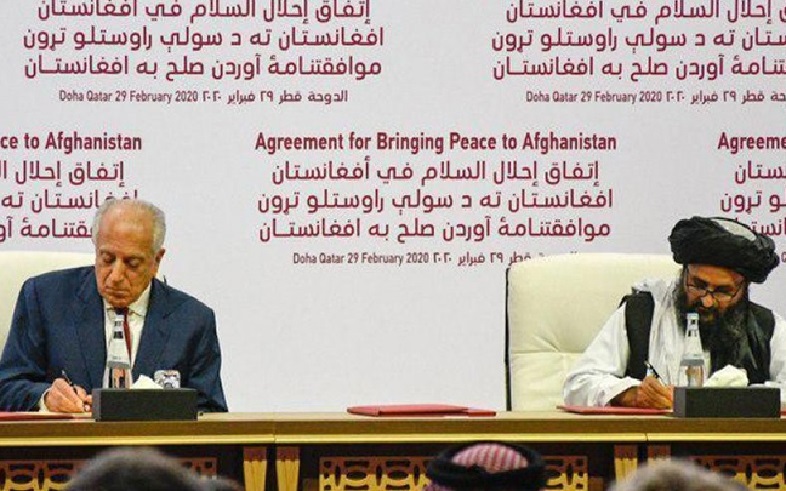Zalmi Khalilzad, the special representative of the United States of America in the Afghan peace negotiations and his role in the process that ultimately led to signing of the Doha Agreement between the United States of America and the Taliban, has always been the subject of the most severe criticism and many accusations have been directed at him.
Recently, Mrs. Hederbar, the deputy of the human rights department of the Human Rights Watch organization, also accused Khalilzad for helping to create a disaster in Afghanistan. In explaining his claim, she wrote that until now Khalilzad has not used his concern about human rights, including the rights of women and girls, and has not had any clear and transparent responsibilities and duties towards the citizens of Afghanistan. This is while Mrs. Haderbar criticized Khalilzad in the past regarding the neglect of women during the Doha negotiations.
The performance of Zalmi Khalilzad during his mission as the special representative of the United States in the peace talks of Afghanistan, especially after the Doha agreement, the withdrawal of the United States and the fall of the republican government, has been severely questioned by politicians, civil activists and human rights activists. But he has never been able or wanted to explain or defend the consequences of his actions.
The biggest accusation against the American government and Mr. Khalilzad as the competent representative of this country in the Afghan peace negotiations is keeping the Afghan government away from the negotiation process, hiding in the negotiations and not sharing the agenda and the results of the discussions with it, and finally signing the Doha agreement without the presence of Afghan government and people led to serious and extensive discussions.
The American government has been the largest financial and political supporter of the Afghan government in the last twenty years, which came to Afghanistan with the claim of consolidating democracy, forming a democratic government, and fighting international terrorism, and spent hundreds of billions dollars along the way, while the strategic cooperation agreement had signed with Afghanistan, he crossed out all their claimed commitments and values, and without considering the consequences and damages of his untimely and hasty exit, they left Afghanistan and played the leading role in the emergence of a complex political crisis in the country.
It seems that Zalmi Khalilzad has played a prominent role in reaching the point where Afghanistan is now and has defined America as a weak and failed country in the world. The output of many existing analyzes show that Mr. Khalilzad, in a multi-sided game, was able to deceive both the Biden government and the government of Afghanistan at the time, and without considering the long-term national interests of the United States, he acted on what he had in his heart. As a conclusion he involved Afghanistan in a political crisis.
Undoubtedly, the result of the political dirty game that Zalmi Khalilzad played with the conclusion of the Doha Agreement is to sow the seeds of perhaps another long-term civil war in Afghanistan, because by keeping out the government of the time and other political groups, civil institutions and different social groups deprived the majority of the people and citizens of Afghanistan from their political participation and human rights and created another big complex in the hearts of millions of people.
With the opportunity that was provided in the Afghan peace negotiations process, there was an extraordinary possibility that after long wars and devastating bloodshed, all the involved and interested parties in Afghanistan, with the cooperation of the international community, sit around the same table and with understanding and solidarity, Determine the future fate of Afghanistan by considering the interests of all parties and prevent the creation of another big crisis, any of which may engulf this country and create another disaster.
What Zalmi Khalilzad accomplished was actually a kind of forced transfer of power. It means that he handed over the national power and authority of Afghanistan from a government that did not have universal and comprehensive legitimacy and acceptance and suffered from extensive and catastrophic corruption, to another group, which is perhaps not in a better position than the past government in terms of national and international acceptance and legitimacy. In other words, the only thing that has been ignored and has no importance for Mr. Khalilzad and America is solving the political crisis in Afghanistan, because the Doha Agreement did not change the situation in Afghanistan and did not bring a solution for political and security stability in the country. But it has added another knot to the countless blind knots of the country.
The existence of hidden annexes of the Doha Agreement is another issue that has aroused more suspicions and concerns of Afghan citizens and has brought many speculations. Both sides of this agreement have repeatedly accused each other of violating and not implementing the provisions of the agreement, but they have not spoken clearly about it; this strengthens the possibility that part of the secret agreements will not be implemented and increases suspicions about it.
The expansion of the disaster that America and Khalilzad have created in Afghanistan do not end here; the collapse of Afghanistan’s economy, the loss of hundreds thousands of jobs and the dramatic increase in poverty and unemployment is another great disaster that is the result of Mr. Khalilzad’s performance.
Therefore, Khalilzad and the United States are primarily responsible for the miserable situation currently prevailing in Afghanistan, and they must be held accountable for it.











Read More
Even Iran’s Senior Team Couldn’t Overpower Afghanistan – The Fear Was Evident
Afghanistan National Futsal Team Starts Strong with a Decisive Victory over Tajikistan
Afghanistan National Futsal Team Faces a Tough Challenge in the “Group of Death” at the Islamic Solidarity Games